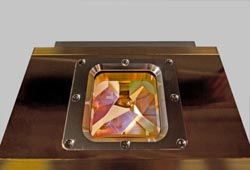Substantial EU financial support

Modul<br>University of Stuttgart (IFSW)
The development of ultra-short-pulse disk lasers (UKP lasers) with a high midrange power is being substantially supported by the EU for three years. The scientific and strategic commitment by the Institute for Laser Tools (IFSW) at the University of Stuttgart to develop the next generation of ultra-short-pulse disk lasers is now leading into two STReP projects (Specific Targeted Research Projects) in the framework of the 7th European Subsidy Programme of the EU. The project is planned to start on 1st November 2013.
Both projects have the aim of disk lasers with several hundred watt midrange power, the one with particularly short pulses (shorter than a tenth of a billionth of a second) on the basis of mutually cooled laser disks made of titanium sapphire (sapphire fortified with titanium), the other with a crystalline wave guide as a pre-amplifier and a laser disk as a main amplifier for cylindrically polarised pulses with a duration of some billionths of seconds. Together the projects have a volume of 9.14 million €, whereby the financial support provided by the EU amounts to 6.37 million €, of which the IFSW will receive 1.9 million €. The projects are coordinated at the IFSW in the business division for laser development and laser optics headed by Dr. Abdou Ahmed.
Prof. Thomas Graf, Head of the Institute for Laser Tools at the University of Stuttgart, commented on the success story: “Along with the very interesting scientific challenges, the development of new ultra- short-pulse disk lasers with a high midrange power is also of great scientific interest with a view to the increase in productivity with the laser-based material processing”.
The consortia comprise the renowned partners: Thales Optronique SA (France), Element Six Ltd. (UK), Centre National de la Recherche Scientifique – CNRS (France), Oxford Lasers Ltd. (UK) and M-Squared Lasers Ltd. (UK) for the development of the titanium sapphire disk lasers (coordination Dr. A. Voß, IFSW, University of Stuttgart, Germany) as well as Time-Bandwidth Products AG (Switzerland), Centre National de la Recherche Scientifique – CNRS (France), Fibercryst SAS (France), Next Scan Technology B.V. (The Netherlands), GFH GmbH (Germany), Schweißtechnische Lehr- und Versuchsanstalt SLV Mecklenburg-Vorpommern (Germany) and Class 4 Laser Professionals AG (Switzerland) for the project on the ultra-short-pulse laser disks with cylindrical polarisation (coordination Dr. M. Abdou Ahmed, IFSW, University of Stuttgart, Germany).
Further information:
Dr. Abdou Ahmed, University of Stuttgart, Institute for Laser Tools,
Twl. 0711/ 685-69755, Email: abdou.ahmed (at) ifsw.uni-stuttgart.de
Dr. Hans-Herwig Geyer, University of Stuttgart, University Communication,
Tel. 0711/685-82555, Email: hans-herwig.geyer (at) hkom.uni-stuttgart.de
Media Contact
More Information:
http://www.uni-stuttgart.deAll latest news from the category: Machine Engineering
Machine engineering is one of Germany’s key industries. The importance of this segment has led to the creation of new university degree programs in fields such as production and logistics, process engineering, vehicle/automotive engineering, production engineering and aerospace engineering among others.
innovations-report offers informative reports and articles covering technologies such as automation, motion, power train, energy, conveyor, plastics, lightweight construction, logistics/warehousing, measurement systems, machine tools and control engineering.
Newest articles

Silicon Carbide Innovation Alliance to drive industrial-scale semiconductor work
Known for its ability to withstand extreme environments and high voltages, silicon carbide (SiC) is a semiconducting material made up of silicon and carbon atoms arranged into crystals that is…

New SPECT/CT technique shows impressive biomarker identification
…offers increased access for prostate cancer patients. A novel SPECT/CT acquisition method can accurately detect radiopharmaceutical biodistribution in a convenient manner for prostate cancer patients, opening the door for more…

How 3D printers can give robots a soft touch
Soft skin coverings and touch sensors have emerged as a promising feature for robots that are both safer and more intuitive for human interaction, but they are expensive and difficult…





















